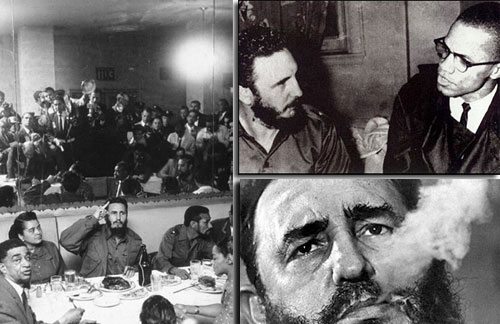
(From left: Castro at Hotel Theresa, Harlem. Top right: Castro and Malcom X. Bottom right: Fidel Castro)
Cuba has gotten some intense media attention recently because of the “retirement†of Fidel Castro, who has passed power on to his brother Raul. Most informed people see this as nothing more than a sham. Raul Castro will probably maintain the totalitarian monopoly of power that was established by Fidel in 1959. But it seems that the possibility of change has made people start to hope.
I have always been aware of Cuba because of the influence of Cuban music on jazz. This was not a one-way street, either. Cuban musicians were profoundly influenced by the work of Duke Ellington, and there were a number of Cuban bands that featured songs composed by the Duke. Harlem was an important location for this interplay between the two cultures. Many people from the Caribbean came to New York and got to experience first-hand the evolution of jazz music. Spanish Harlem was a magnet for aspiring musicians from the Caribbean and the music venues of Harlem accommodated their tastes quite readily.
Broadcasts from New York’s Cotton Club featuring the bands of Cab Calloway and Duke Ellington were picked up in places like Havana and Mexico City throughout the ’30s. “It don’t mean a thing if it ain’t got that swing†was an edict issued by the Duke, and the song bearing that title is a testimony to one of jazz’s most important foundations. And those boys from the Caribbean brought their own special brand of swing with them. Juan Tizol and Mario Bauza played in Duke’s band for many years. Tizol’s composition “Caravan†is considered to be a classic Ellington song that is always included in any serious compilation of Duke’s work.
The playlists of the Savoy Ballroom in Harlem would have Caribbean bands side by side with the American bands. Machito’s band was a favorite in my household, and I was fortunate to have the pleasure of seeing them perform more than once.
In the 1940s, Dizzy Gillespie collaborated with Cuban trumpet player Mario Bauza to use a smaller group of musicians than the prevailing big band format. This idea became part and parcel of the bebop revolution and has endured as Latin Jazz. The term “Latin†is really misleading because the sound is based on the inclusion of West African rhythm structure and instruments that predominated in the Spanish-speaking Caribbean Islands and Brazil. But the result is a wonderfully spicy musical gumbo that includes the best of the musical traditions from North, Central, and South America and the Caribbean. It has created a musical language that is spoken and appreciated around the world. I’m sure it will facilitate a dialog.
The first time Fidel Castro came to New York to address the U.N., he was told by the FBI that he couldn’t leave the borough of Manhattan. Castro turned that situation on its head by staying at the Theresa Hotel in Harlem, where many Cubans were living. It put Harlem on the world stage in a very unique way because Harlem was part of a dialog that began some 30 years earlier. Pictures of Fidel with Joe Louis and Adam Clayton Powell Jr. are seen in newspapers worldwide. Maybe the dialog can begin again in a new century using an old bridge.
Photo credit: literacy rules; Harlem Renaissance
